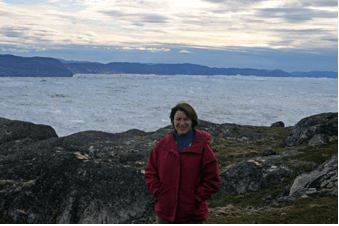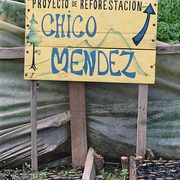-

This past Saturday, Irwin Hall at St. Olaf was full of St. Olaf students and faculty along with a handful of Carleton students eagerly waiting to hear what Amy Klobuchar had to say on climate change. She began by showing some fun video clips about her visit to Greenland last summer in which, decked out in rain gear, she floats in fishing boats around icebergs. As the video is geared towards kids, Klobuchar frequently uses it when she speaks at schools about climate change.
Though Greenland’s melting ice sheets may not seem directly linked to the lives of Minnesotans, Klobuchar made the issue if rising global temperature hit home by drawing a connection with the decreasing water levels that we are currently experiencing in the Great Lakes. She explained that barge traffic is an essential part of the economy and supplies many jobs in northern Minnesota. The dropping water level of Lake Superior has already done damage to the barge traffic industry.
When Klobuchar approached the issue of what is being done to address such problems, she made it clear that leadership is coming from individual states, not Washington. It was evident that she feels that Minnesota is doing its part to be a leader on climate change. She was beaming as she referenced Minnesota’s renewable energy standard which commits the state to using 25% renewables by the year 2025.
-
Rachel English is a philosophy major in the class of 2008. This article was originally published in the Viewpoints section of the Carletonian.
On October 24th, the Sustainable Endowment Institute (SEI) published its second annual “College Sustainability Report Card.” To almost everyone’s surprise, as we on the campus noted no huge leap in campus sustainability during the same time frame, Carleton managed to bound from a C+ to an A- between this year’s report and last. The change was mainly due to our catapult from C’s and F’s to A’s and B’s in the Endowment categories, prompting Carleton’s recognition as one of three “Endowment Sustainability Leader,” and contributing to our recognition as one of six “Overall Sustainability Leaders.”
The main boost came, not from anything outstanding Carleton did, but from SEI’s ineffective evaluation procedures. Carleton had, and has had for the last three years, the Carleton Responsible Investing Committee (CRIC). But SEI could not find it–it noted in its first report that Carleton “has not made any public statements” about its investment practices, causing Carleton to earn an F in two of the three investment categories. This is a problem because, in addition to a survey, SEI’s only method of evaluation is–according to the methods section of their report–through “publicly available documentation. Sources included the institution’s website and media coverage,” as well as more reliable places like the Association for the Advancement of Sustainability in Higher Education (AASHE).
Of course, no one really can be blamed for failing to find information on Carleton’s unsearchable website, but you might think that the “Administrative and Governance Committees” webpage which does list the CRIC would be one obvious place to begin a search. (To be fair, although the CRIC does have a webpage, no link is provided from the committees webpage, although I was assured one would be coming soon).
The real difference between this year’s results and last’s seems to be that Carleton actually took the survey seriously this year. As a senior college administrator pointed out, this was somewhat hard to do, since SEI seems like somewhat of a joke–last year it sent each part of the survey to a separate person, in the process mistaking the Burton dining hall manager for Carleton’s actual dining manager.Continue by clicking the “read more” link below
-
A dinner fundraiser for the Chico Mendes Reforestation Project in Cantel, Guatemala, at St. Olaf College last Thursday illuminated some of the struggles and triumphs of sustainable development. Stories from Carleton and St. Olaf students who had visited the reforestation project during a study abroad program helped give a human face to these difficult international issues.
The Chico Mendes Reforestation Project was founded in 1999 in response to a dwindling groundwater supply because of decades of deforestation. As a result, Cantel only has access to water for a few hours a day. The project has planted hundreds of thousands of trees, including 65,000 last year alone. Planting trees in Cantel is considered a subversive political act, a defiant stance against the government that allows this deforestation to continue–a sharp contrast, the students noted, to the idea of connecting to the earth and holding hands and singing Kumbaya. Here, planting trees is a necessity to the continuity of community life, and a politically subversive one at that.
Under Guatemalan law, there must be a certain number of trees planted to replace those that are cut down. The loggers usually do a pretty hasty job of replanting and then leave the seedlings alone. This is not an effective solution. As the students learned in Cantel, it takes a lot of love to make just one tree grow. The Chico Mendes Reforestation Project actually devotes the time and care to the trees they need to thrive.
Continue by clicking the “read more” link below
Categories
- Building and Planning
- Carleton's Wind Turbines
- Climate Change
- Conferences
- Cowling Arboretum
- Ecosystem Management
- Emissions and Offsets
- Energy Sources & Uses
- Environmental Justice
- Events
- Food
- Higher Education
- International News
- National News
- News
- STA Program
- Student Life
- Student Projects
- Sustainability
- Sustainable Planning & Development
- Transportation
- Waste

